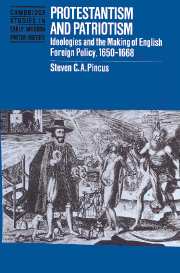Book contents
- Frontmatter
- Contents
- Acknowledgments
- List of abbreviations
- 1 Introduction
- Part I The rod of the Lord: ideology and the outbreak of the First Anglo-Dutch War
- Part II To unite against the common enemy: the 1654 Treaty of Westminster and the end of apocalyptic foreign policy
- Part III Popery, trade, and universal monarchy: ideology and the outbreak of the Second Anglo-Dutch War
- 11 Historiographical overview
- 12 The establishment of an Orangist foreign policy
- 13 The Anglo-Dutch treaty of 1662
- 14 The Northern Rebellion and the reestablishment of Anglican Royalist consensus
- 15 The April 1664 trade resolution
- 16 Popery, trade, and universal monarchy
- Part IV The Medway, Breda, and the Triple Alliance: the collapse of Anglican Royalist Foreign Policy
- Conclusion
- Bibliography
- Index
- Titles in the series
15 - The April 1664 trade resolution
Published online by Cambridge University Press: 01 October 2009
- Frontmatter
- Contents
- Acknowledgments
- List of abbreviations
- 1 Introduction
- Part I The rod of the Lord: ideology and the outbreak of the First Anglo-Dutch War
- Part II To unite against the common enemy: the 1654 Treaty of Westminster and the end of apocalyptic foreign policy
- Part III Popery, trade, and universal monarchy: ideology and the outbreak of the Second Anglo-Dutch War
- 11 Historiographical overview
- 12 The establishment of an Orangist foreign policy
- 13 The Anglo-Dutch treaty of 1662
- 14 The Northern Rebellion and the reestablishment of Anglican Royalist consensus
- 15 The April 1664 trade resolution
- 16 Popery, trade, and universal monarchy
- Part IV The Medway, Breda, and the Triple Alliance: the collapse of Anglican Royalist Foreign Policy
- Conclusion
- Bibliography
- Index
- Titles in the series
Summary
On 21 April 1664 the House of Commons passed a resolution declaring “that the several, and respective wrongs, dishonors and indignities done to his Majesty by the subjects of the United Provinces, by invading his rights in India, Africa, and elsewhere; and the damages, affronts and injuries done by them to our merchants are the greatest obstructions of foreign trade,” adding “for the prevention of the like in future; and in prosecution thereof, this House doth resolve, they will with their lives, and fortunes assist his Majesty against all opposition whatsoever.” Though Samuel Pepys thought it “a very high vote,” Joseph Williamson waxed enthusiastic: “Great zeal is in the Parliament to get themselves justice by the only argument that moves Holland, arms.”
Historians have explained the passage of the April trade resolution either as the result of pressure from the London mercantile community, or as an attempt to reassert English national honor. However, that the resolution was passed by a Parliament convinced of the urgency of eradicating sectarianism and sedition, makes one wonder whether it was the straightforward piece of economic confrontationalism or national self-aggrandizement which historians have claimed it to be. Indeed at least one important member of Charles's Privy Council saw the resolution as part and parcel of the Anglican Royalist reaction.2 It will “be a point of infinite reputation to his Majesty's government,” wrote Sir Henry Bennet to the Duke of Ormonde, that “in so short a session the world shall see the Triennial Bill repealed, and such a vote as this, after they had been prepared to expect nothing but contests and disputes with the crown in the most jealous points belonging to it.”
- Type
- Chapter
- Information
- Protestantism and PatriotismIdeologies and the Making of English Foreign Policy, 1650–1668, pp. 237 - 255Publisher: Cambridge University PressPrint publication year: 1996



